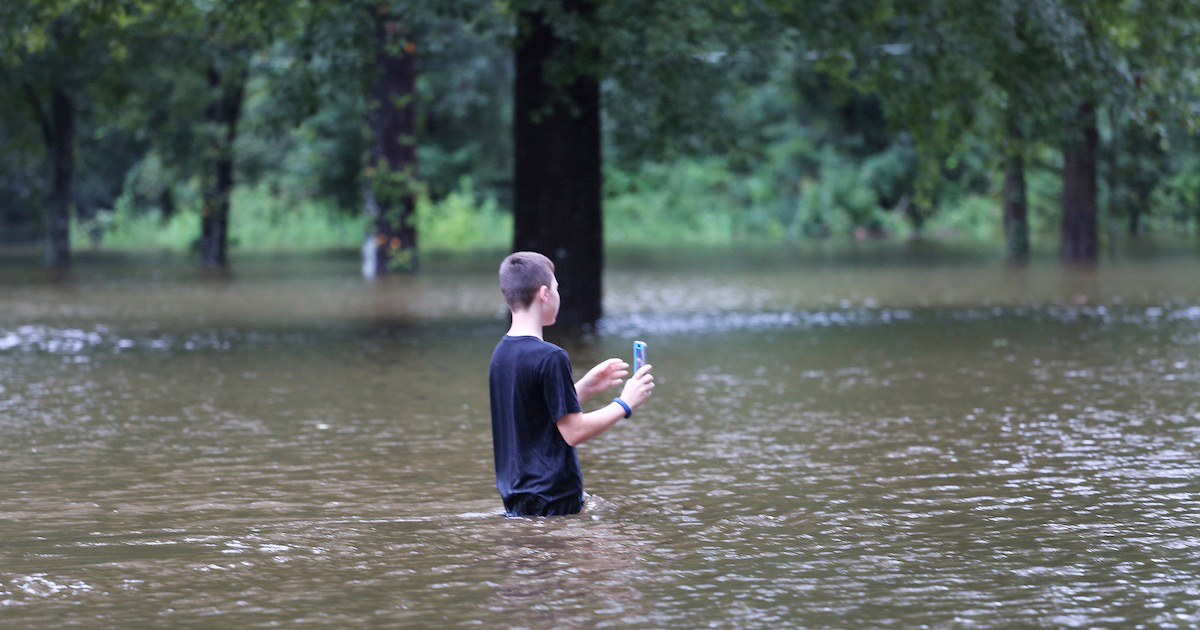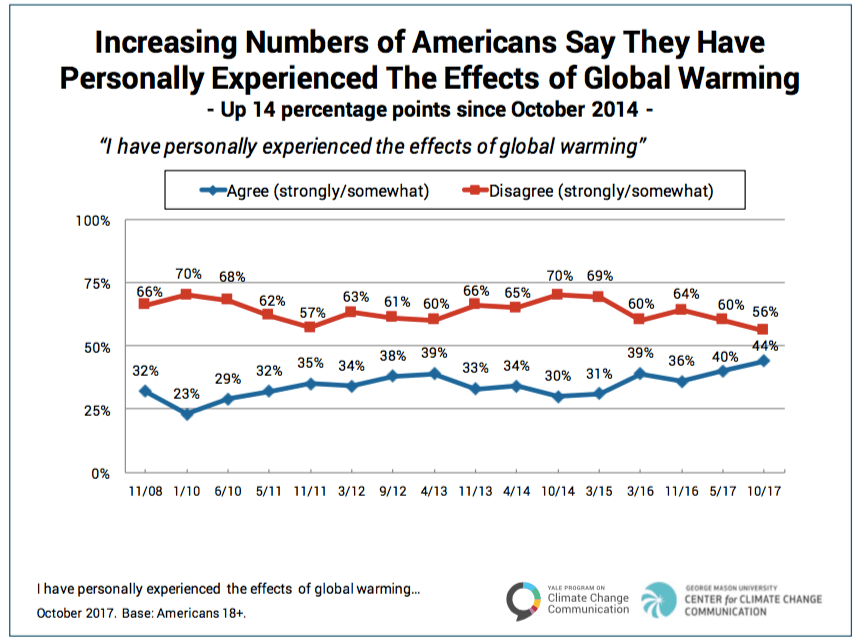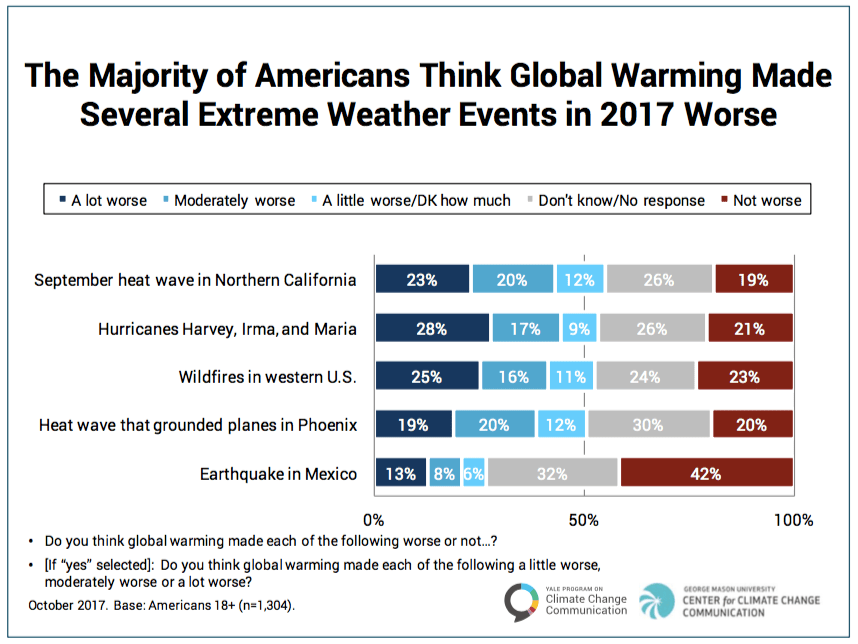

Hurricane Harvey flooding. Jill Carlson / Flickr
As someone who writes about the environment on a near-daily basis, the fact that a large chunk of Americans (about one in eight) reject the near scientific consensus of climate change can be a tough pill to swallow.
But after a year of record-breaking heatwaves, massive wildfires in the west, and a string of destructive hurricanes, it appears that my fellow U.S. citizens are waking up to the realities of our hot, new world, according to the latest nationally representative survey from the Yale Program on Climate Change Communication and the George Mason University Center for Climate Change Communication.
The poll, which has tracked Americans’ attitudes about climate since 2008, revealed an uptick in Americans’ concern about climate change, including “substantial increases” in the certainty that the global phenomenon is happening and currently harming people in the U.S.
The survey, based on the replies of 1,304 adults between Oct. 20 to Nov. 1, showed that seven in ten participants think climate change is happening—an increase of eight percentage points since March 2015. The good news is that those who think global warming is real outnumber climate deniers by more than 5 to 1.
One of the most significant findings is that roughly one in five (22 percent) Americans are “very worried” about climate change—the highest levels since the surveys began, or about twice the number that said they were “very worried” from the March 2015 poll.

Four out of ten Americans also said that they have personally experienced the effects of global warming, and the issue is also personally important for two out of three Americans.
“That’s probably because they perceive direct climate impacts,” as environmental scientist Dana Nuccitelli pointed out in the Guardian, citing how 64 percent of survey participants said that global warming is affecting the weather.
“Americans also connecting the dots to specific extreme weather events,” he pointed out.
Indeed, scientists have noted that extreme weather can be made all the more frequent and destructive due to climate change.

Here are the key findings from the survey:
• Seven in ten Americans (71 percent) think global warming is happening, an increase of eight percentage points since March 2015. Only about one in eight Americans (13 percent) think global warming is not happening. Americans who think global warming is happening outnumber those who think it is not by more than five to one.
• Americans are also becoming certain global warming is happening—47 percent are “extremely” or “very” sure it is happening, an increase of 10 percentage points since March 2015. By contrast, far fewer—seven percent—are “extremely” or “very sure” global warming is not happening.
• Over half of Americans (54 percent) understand that global warming is mostly human-caused. By contrast, one in three (33 percent) say it is due mostly to natural changes in the environment.
• Only about one in seven Americans (15 percent) understand that nearly all climate scientists (more than 90 percent) are convinced that human-caused global warming is happening.
• More than six in ten Americans (63 percent) say they are at least “somewhat worried” about global warming. About one in five (22 percent) are “very worried” about it—the highest levels since our surveys began, and twice the proportion that were “very worried” in March 2015.
• Two in three Americans feel “interested” in global warming (67 percent), and more than half feel “disgusted” (55 percent) or “helpless” (52 percent). Fewer than half feel “hopeful” (44 percent).
• Nearly two in three Americans (64 percent) think global warming is affecting weather in the U.S., and one in three think weather is being affected “a lot” (33 percent), an increase of eight percentage points since May 2017.
• A majority of Americans think global warming made several extreme events in 2017 worse, including the heat waves in California (55 percent) and Arizona (51 percent), hurricanes Harvey, Irma, and Maria (54 percent), and wildfires in the western U.S. (52 percent).
• More than three in four Americans (78 percent) are interested in learning about how global warming is or is not affecting extreme weather events.
• More than four in ten Americans (44 percent) say they have personally experienced the effects of global warming, an increase of 13 percentage points since March 2015.
• Four in ten Americans (42 percent) think people in the U.S. are being harmed by global warming “right now.” The proportion that believes people are being harmed “right now” has increased by 10 percentage points since March 2015.
• Half of Americans think they (50 percent) or their family (54 percent) will be harmed by global warming. Even more think global warming will harm people in the U.S. (67 percent), the world’s poor or people in developing countries (both 71 percent), future generations of people (75 percent) or plant and animal species (75 percent).
• Most Americans think global warming will have future impacts, causing more melting glaciers (67 percent), severe heat waves (64 percent), droughts and water shortages (63 percent), floods (61 percent), and other impacts over the next 20 years.
• Two in three Americans (67 percent) say the issue of global warming is either “extremely” (12 percent), “very” (19 percent), or “somewhat” (37 percent) important to them personally, while one in three (33 percent) say it is either “not too” (19 percent) or “not at all” (14 percent) important personally. The proportion that say it is personally important has increased by 11 percentage points since March 2015.
• Nearly four in ten Americans (38 percent) say they discuss global warming with family and friends “often” or “occasionally,” an increase of 12 percentage points since March 2015. However, more say they “rarely” or “never” discuss it (62 percent). Additionally, half of Americans (51 percent) say they hear about global warming in the media at least once a month, and one in four (25 percent) say they hear people they know talk about global warming at least once a month.
• More than half of Americans (54 percent) say they have thought “a lot” (22 percent) or “some” (32 percent) about global warming. Fewer say they have thought about global warming just “a little” (32 percent) or “not at all” (14 percent).
• Few Americans are confident that humans will reduce global warming. Nearly half (48 percent) say humans could reduce global warming, but it’s unclear at this point whether we will do what is necessary, and one in four (25 percent) say we won’t reduce global warming because people are unwilling to change their behavior. Only five percent say humans can and will successfully reduce global warming.
• Large majorities of Americans think of global warming as an environmental (78 percent), scientific (71 percent), agricultural (66 percent), severe weather (65 percent), health (62 percent), economic (60 percent), or political issue (60 percent). Fewer think it is a moral (41 percent), national security (29 percent), poverty (28 percent), social justice (26 percent), or religious issue (nine percent).

 233k
233k  41k
41k  Subscribe
Subscribe 